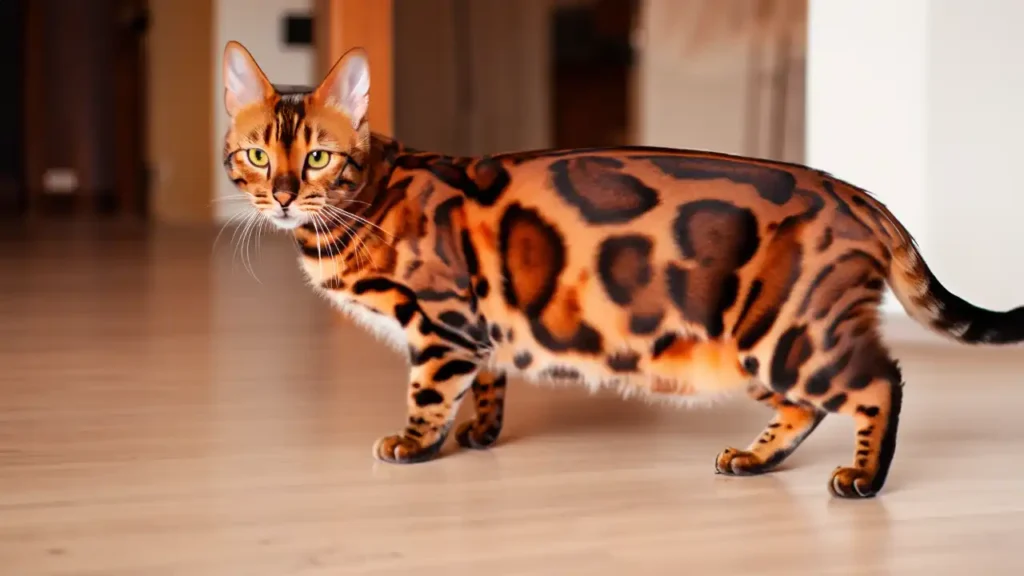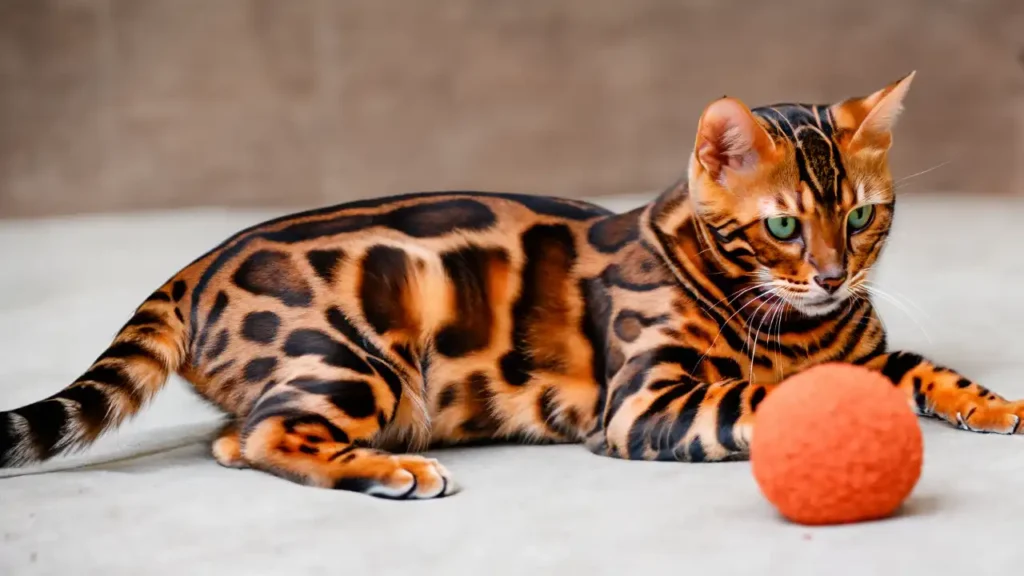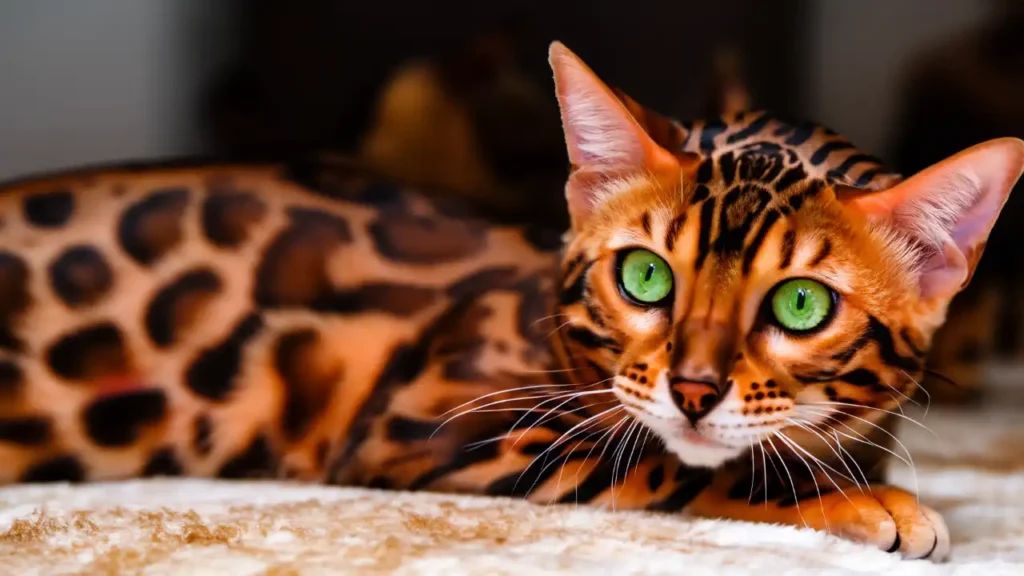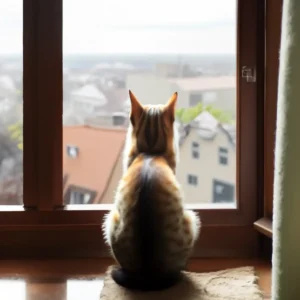Bengal cats have exploded in popularity over the last couple of decades, and it’s easy to see why. These exotic-looking felines boast stunningly wild coats, and their personalities are just as bold. If you’re thinking about adding one of these little leopards to your family, read on to learn all about their appearance, temperament, ideal care, and more.
Table of Contents
An Exotic Blend of Domestic Cat and Wildcat

Bengals are a hybrid breed, originally developed by crossing an Asian Leopard Cat with a domestic shorthair cat. This initial crossing introduced the exotic wildcat genes that give Bengals their spectacular spotted and marbled coats. Later on, some Egyptian Mau was bred in to produce the sweet temperament Bengals are known for today.
The result is a medium-to-large cat breed that looks like no ordinary house cat! Bengals have lush, dense fur with patterns that mimic leopards, jaguars, and other wild cats. No two coats are exactly the same. Some of the common colors and patterns found in Bengals include:
- Brown spotted tabby with black or blue accents
- Silver-spotted tabby with charcoal or dove gray tones
- Brown marbled tabby in a blend of warm browns
- Snow-marbled tabby in a sleek gray and white blend
Many Bengals sport gorgeous rosette spots, which consist of a dark center surrounded by irregular stripes in a ring. This gives them an extra “wild” look. Their vividly marked coats stand out beautifully against the black outline markings. And those eyes! Bengals often have stunning light green, blue-green, or gold eyes with dark rims that resemble eyeliner. Simply gorgeous!
Playful Personalities That Demand Attention

Beyond their bombastic coats, Bengal cats appeal to owners because of their energetic, friendly personalities. Bengals are extremely intelligent and energetic, needing interactive playtime and environmental enrichment to stay happy.
They love climbing, leaping, stalking toys, learning tricks, playing fetch and generally showing off their agility. A bored Bengal can get into mischief! Be prepared to provide ample playtime as well as cat towers, wall shelves, or other vertical spaces for climbing and perching. This allows your Bengal to enjoy fully demonstrating their athletic talents.
While lively and spirited, well-raised Bengals also enjoy receiving and giving affection. They form close bonds with their families and often follow their favorite people around devotedly. Many Bengals can be harness-trained to go for walks, play fetch endlessly, or learn commands and tricks. Their high curiosity motivates them to continually investigate their surroundings.
Special Care Requirements for These Wild Beauties

While irresistibly captivating, Bengal cats do have some special needs to stay healthy and content:
- Lots of interactive playtimes and exercise daily – Bengals need a significant time investment to stay entertained and burn energy. Plan on at least an hour or two of direct play, plus access to climbing structures and toys when alone.
- Tall cat trees and wall shelves for climbing/perching – Bengals love to climb, perch up high, and survey their domain. Ensure they have appropriate outlets like cat trees, wall-mounted shelves, and window perches.
- High-protein, meat-based diet – These athletic cats do best on a high-protein, low-carb feline diet. Wet and raw foods often work well.
- Regular grooming – Bengals have a thick coat that needs weekly brushing and combing to look its best. This helps remove loose hair and prevent mats.
- Secure any screens/windows – Smart and agile, Bengals can easily escape through windows or doors if not properly secured. Prevent roaming with secure screens.
- Early socialization and training – Early positive handling and exposure to new things allows Bengals to develop into friendly, confident cats. Put in the work as a kitten!
As far as health, Bengals are generally robust but can be prone to some inherited conditions. Reputable breeders screen their breeding cats for known issues like progressive retinal atrophy, heart disease, and autoimmune disorders. Be sure to ask about genetic health testing before bringing one home.
Proper early socialization and training is also vital, as Bengals tend to be more vocal and energetic than your average house cat. But with the right upbringing and understanding of their needs, Bengals mature into remarkably captivating lifelong friends.
Finding Your Perfect Exotic Feline Friend
If the Bengal’s wild charms have totally ensnared you, first do your homework before jumping in. Here are some tips for finding the right kitten:
- Connect with reputable breeders who emphasize health and temperament. Meet parent cats if possible.
- Ask to see documentation of genetic testing done on the parents to screen for known issues.
- Make sure kittens have been well socialized – meet the breeder in person.
- Pick an outgoing, confident kitten who approaches you willingly. Shy Bengals can be more challenging.
- Expect to be put on a waitlist, as demand for Bengals is high. Patience pays off!
Bringing home one of these exotic beauties is sure to be the beginning of many exciting adventures together. Just remember they require an active lifestyle and ample playtime. Ready to welcome a miniature leopard into your life? Let the fun begin! With the right understanding and care, a Bengal cat will quickly steal your heart with their wild beauty and endearing personality.
Frequently Asked Questions About Bengal Cats
How big do Bengal cats get?
Bengals are medium-to-large cats, with males averaging 10-15 lbs and females 8-12 lbs. Some can reach up to 20 lbs.
Are Bengal cats hypoallergenic?
No, Bengals still produce the Fel D1 protein that causes allergies in people sensitive to cats. But their luxurious coat may shed less dander.
How long do Bengal cats live?
With proper care, Bengals typically live 12-16 years. Make sure to feed them high-quality food and bring them for annual vet checkups.
Are Bengal cats aggressive?
Well-bred, properly socialized Bengals should not be aggressive. They can be boisterous players though, so supervision with kids or elderly pets is recommended.
Do Bengal cats need baths?
Most Bengals groom themselves meticulously like other cats. Occasional bathing is okay if they get quite dirty, but avoid over-bathing which can dry their skin.
Are Bengals good with other pets?
Early socialization allows Bengals to live harmoniously with other pets. Their energetic play may overwhelm timid animals though, so supervision is key.
Hope this overview gives you a better idea of what makes Bengal cats so alluring! Let me know if you have any other questions.


